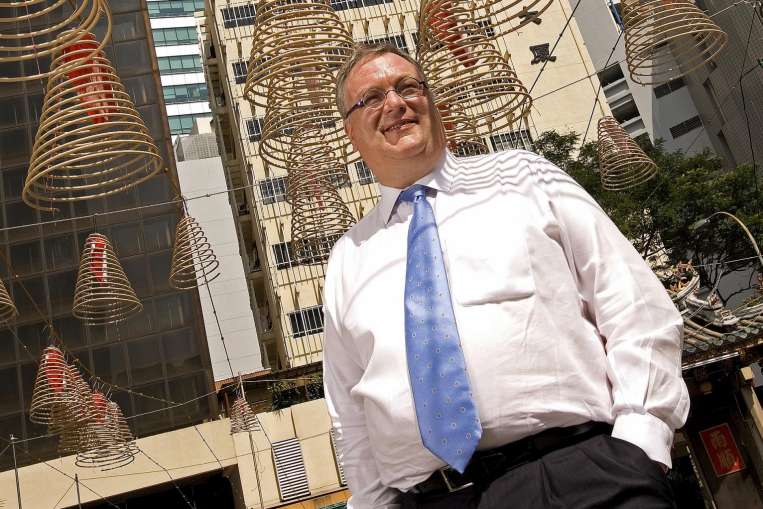
Aberdeen Asset Management Asia managing director Hugh Young invested in the Aberdeen Pacific Equity Fund from the first day of its launch in 1997. It has climbed more than 440 per cent.PHOTO: ABERDEEN ASSET MANAGEMENT ASIA
Singapore-based Hugh Young, 57, spent 30 years running Asian equity funds, after joining Aberdeen – one of Europe’s largest listed fund houses – in London in 1985.
He is now managing director of Aberdeen Asset Management Asia and is well regarded in his field. A senior executive was quoted in The Financial Times as saying he is “the backbone of the emerging market business and has been instrumental in attracting new clients.”
Young graduated from the University of Exeter with a politics degree in 1979 and found a job as an investment analyst with a small stockbroker in London a year later. He says the job was not popular and badly paid but it gave him a solid training in finance. He later moved to the institutional side of things when he took a job at a life assurance company.
He says: “Investment is art as much as science and the skill is in spotting opportunities that the market has not yet priced in.”
Q What interests you about investing?
A Not so much making money as being part of current events and the pleasure of watching the right companies grow and prosper over time, plus – something that has developed over the years – the ability to promote best practices such as corporate governance.
Q What were some of those companies, and what did they have in common that made them stand out?
A Our ideal company is one that grows earnings 10 percent to 15 percent, year after year. If it can do that, why sell? The stock price will reflect those gains over time, even if not perfectly. Banks like OCBC or UOB, for example. They’ve had clear plans and not overreached themselves, for example, by trying to develop more risky proprietary trading. True, they’re not everyone’s idea of excitement but then we’re investors, not speculators.
Q Describe your investment philosophy and strategy.
A It’s all about seeing through the cyclical and momentum moves, and first identifying the companies that we think will be long-term winners, irrespective of cycles, and then going against momentum moves in the markets to make our purchases or sales.
We refer a lot to price-earnings ratios but there is much more behind it. We are primarily looking at real cash, cash flow and asset backing. Typically, we avoid heavily indebted companies as they have limited room for maneuver.
Our style is to focus on fundamentals – in plain language, what makes a company tick – so we like companies that are easy to understand, stick to their core competence, and have defendable competitive advantages. This tends to mean the sector is secondary in our consideration, although we prefer consumer areas, which we interpret broadly to include financials, property, telecommunications and transport because they tend to be less cyclical.
Over the years we’ve invested in a nice mix of family-run companies, local champions and multinationals.
Q What’s in your portfolio?
A I invested in our flagship Aberdeen Pacific Equity Fund from the first day of its launch in Singapore in 1997. The fund has climbed more than 440 per cent compared with its benchmark return of 250 per cent as at end of June this year.
The fund’s annualized return since inception on Dec. 5, 1997, is 9.8 percent, compared with the benchmark return of 7.4 per cent.
Q What was your best investment?
A One of our best investments was a simple story – Unilever Indonesia.
Unilever was an early investor in Indonesia and, for historical reasons, has long had a Jakarta listing for its businesses.
It has done well by investing in manufacturing, localising products and controlling costs and distribution, which is easier than it sounds when you have to build supplier or wholesaler networks over vast distances.
Periodically, we have taken profits in the stock when it has become expensive. Equally, when the market sells down for external reasons and it has looked cheap, we’ve bought again. We have also missed out on many and have made many mistakes over the years.
Q What would you say to someone who is starting out and trying to put together a portfolio, even if they are in their 40s?
A It is not easy to build a portfolio from scratch, nor is it cheap.
The best is to start with pooled funds, such as unit trusts, and then learn, and from there venture into direct holdings.
Nothing beats doing the work.
It’s impossible to give generic information to a 40-year-old but if he has no obligations such as children or a mortgage , investing in equities would be the best bet for that period, and within that, a sizeable exposure to Asia and emerging markets.
RELATED STORIES
Just 20, and his assets are worth over $100K
Out of poverty into lap of luxury